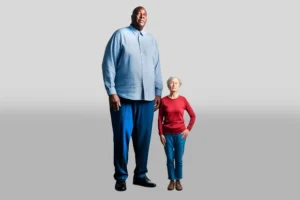Height is often one of the first things we notice about someone, and it has long been associated with social status, power, and even success. But does height actually affect career opportunities and success? Numerous studies suggest that being taller may give individuals an edge in leadership roles, salary negotiations, and social perceptions. This article explores how height may influence career outcomes, the psychology behind it, and whether shorter individuals are at a disadvantage in the workplace.
1. The Perception of Height: Taller Equals More Authority?
1.1. Height and Leadership
Studies have shown that taller individuals are often perceived as more authoritative and capable leaders. In fact, many corporate CEOs and political leaders tend to be taller than the average population.
- Statistical Trends: Research from the University of Florida revealed that every inch of height corresponds to a salary increase of about $789 per year. Over a 30-year career, that can add up to tens of thousands of dollars more for taller employees.
- Why This Happens: Taller individuals are often seen as more dominant, confident, and physically imposing, traits that are frequently associated with leadership qualities. This “heightism” bias can subconsciously influence hiring managers and recruiters.
1.2. Historical and Cultural Bias
Height has symbolized power and authority throughout history. For example, kings and military leaders were often depicted as tall and strong, reinforcing the idea that height is linked to leadership abilities.
- Modern Impact: This bias still plays a role in today’s corporate environments, with taller individuals often being given more leadership opportunities, even if their actual skills are comparable to shorter colleagues.
2. Salary Discrepancies: How Height Influences Earnings
2.1. The Height Premium
Height appears to be a factor in salary disparities. Studies suggest that taller employees generally earn more than their shorter counterparts.
- Economic Studies: One study by the Journal of Applied Psychology found that each additional inch of height equates to approximately a 1.5-2% increase in wages, with taller people often being viewed as more competent and professional.
- Gender Differences: While both tall men and women tend to earn more, the effect is stronger for men. Tall men are more likely to be promoted into higher-paying roles, while tall women may face more complex social biases.
2.2. Bias in Hiring and Promotion
Tall candidates may also be preferred in job interviews, especially for leadership roles. Taller individuals may be seen as more capable, confident, and even charismatic—traits that often lead to better job prospects and higher salaries.
- Self-Fulfilling Prophecy: Because tall people are often treated with more respect and given more opportunities, they may develop higher self-esteem and confidence, which reinforces their career success.
3. Height in Different Careers: Advantages and Limitations
3.1. Professions Where Height Matters
There are certain careers where height can be a distinct advantage. For example:
- Corporate Leadership: Many top CEOs, such as those from Fortune 500 companies, tend to be taller than average.
- Law and Politics: Height can be a factor in professions that require authority and public speaking, where taller individuals may command more respect.
- Sports and Modeling: Of course, professions like basketball and fashion modeling are heavily influenced by height, where taller individuals dominate.
3.2. Professions Where Height Has No Impact
There are also fields where height may not play as significant a role in career success, such as:
- Creative Fields: Professions like writing, design, and art focus more on talent and skills than physical appearance.
- Technology and Research: Fields that value intellectual output and technical skills over physical traits are less likely to exhibit height biases.
4. Shorter People in the Workplace: Overcoming Height Bias
4.1. Developing Presence and Confidence
Shorter individuals may face subtle or overt biases in the workplace, but there are strategies for overcoming these challenges:
- Building Presence: Developing a strong presence through posture, body language, and communication skills can compensate for height. Confidence and assertiveness often have more of an impact than physical stature.
- Focusing on Skills: Demonstrating competence, reliability, and leadership skills can help overcome any height bias and allow shorter individuals to excel in their careers.
4.2. Success Stories of Shorter Leaders
While height might play a role in perceptions, many successful individuals have proven that stature is not everything. Leaders like Napoleon Bonaparte (who was actually of average height for his time), President Franklin D. Roosevelt, and Mark Zuckerberg, the founder of Facebook, have all reached the pinnacle of their fields without relying on height to establish authority.
5. The Psychological Effects of Height in Career Success
5.1. The Halo Effect: More Than Just Height
The psychological concept known as the “halo effect” suggests that people tend to attribute positive characteristics (such as intelligence and competence) to individuals who possess a single prominent positive trait, like height.
- Impact in Job Interviews: In interviews, taller candidates may benefit from this bias, receiving more favorable evaluations even when qualifications are similar to those of shorter candidates.
5.2. Height and Self-Esteem
Height can also impact self-esteem, with taller individuals often reporting higher levels of confidence and self-worth. This can translate into better negotiation skills, more assertiveness, and greater willingness to take risks—all traits that can lead to career success.
6. Challenging the Bias: Promoting Equal Opportunities
6.1. Awareness and Bias Reduction
Understanding and recognizing height bias is the first step in reducing its impact in the workplace. Employers can play an active role by:
- Bias Training: Implementing bias training programs to ensure that hiring and promotions are based on skills, experience, and performance rather than physical characteristics like height.
- Equal Opportunities: Creating a workplace culture that values diversity in all forms, including physical stature, and ensuring that everyone has equal opportunities for career advancement.
6.2. Focusing on Talent, Not Height
While height may influence first impressions, career success ultimately depends on an individual’s skills, performance, and dedication. Challenging height bias can open doors for more inclusive hiring practices that value what truly matters: talent and potential.
Conclusion:
While height can play a role in career success, particularly in leadership roles and salary negotiations, it is by no means the sole determinant of professional achievement. Shorter individuals can and do succeed at the highest levels by focusing on developing confidence, skills, and competence. By raising awareness of height bias, we can create more equitable workplaces where talent and ability matter far more than stature.
More Articles:
Tallest vs Shortest Person in History: Unbelievable Records
Famous Characters and Their Heights: From Fiction to Reality



